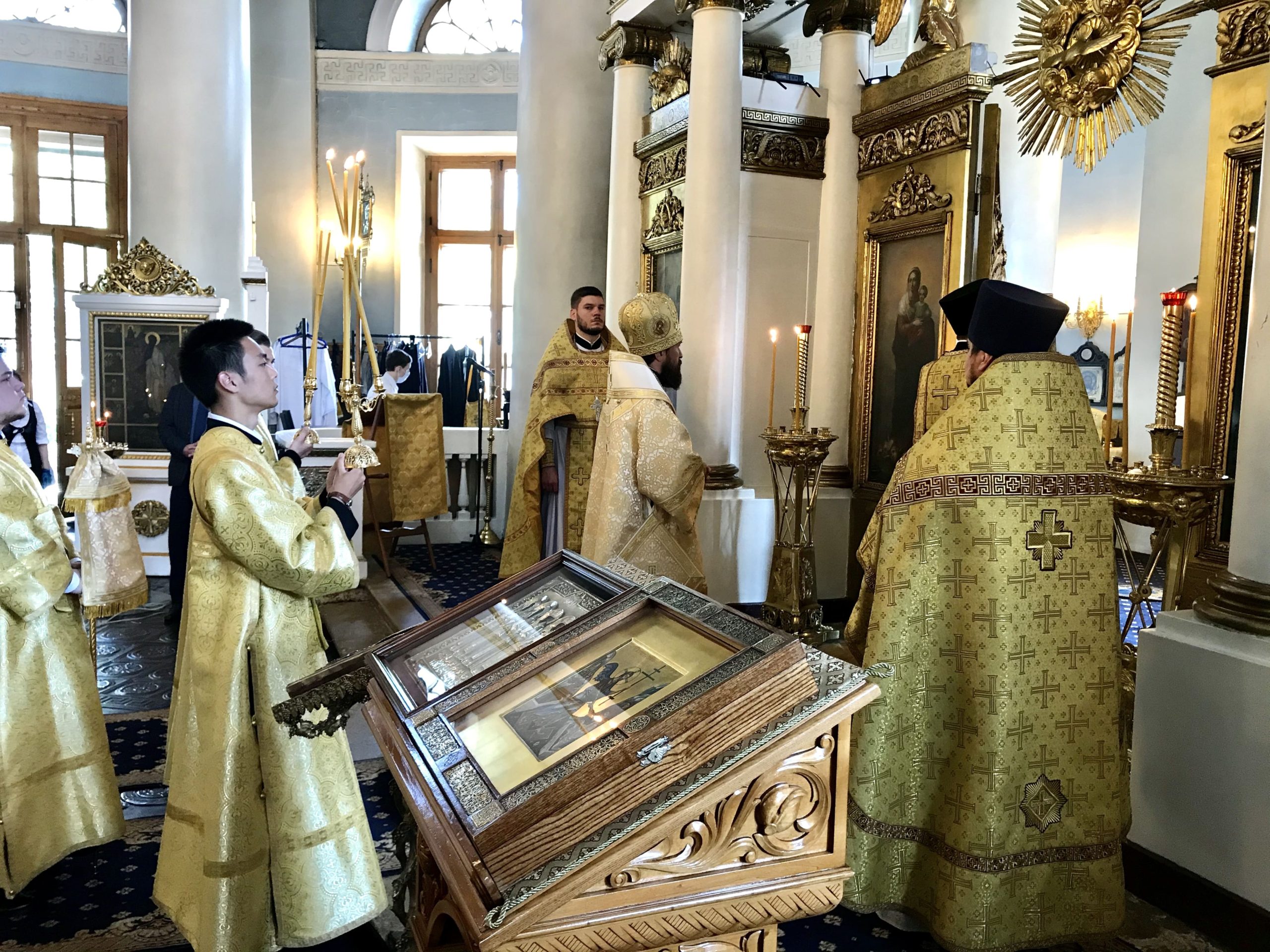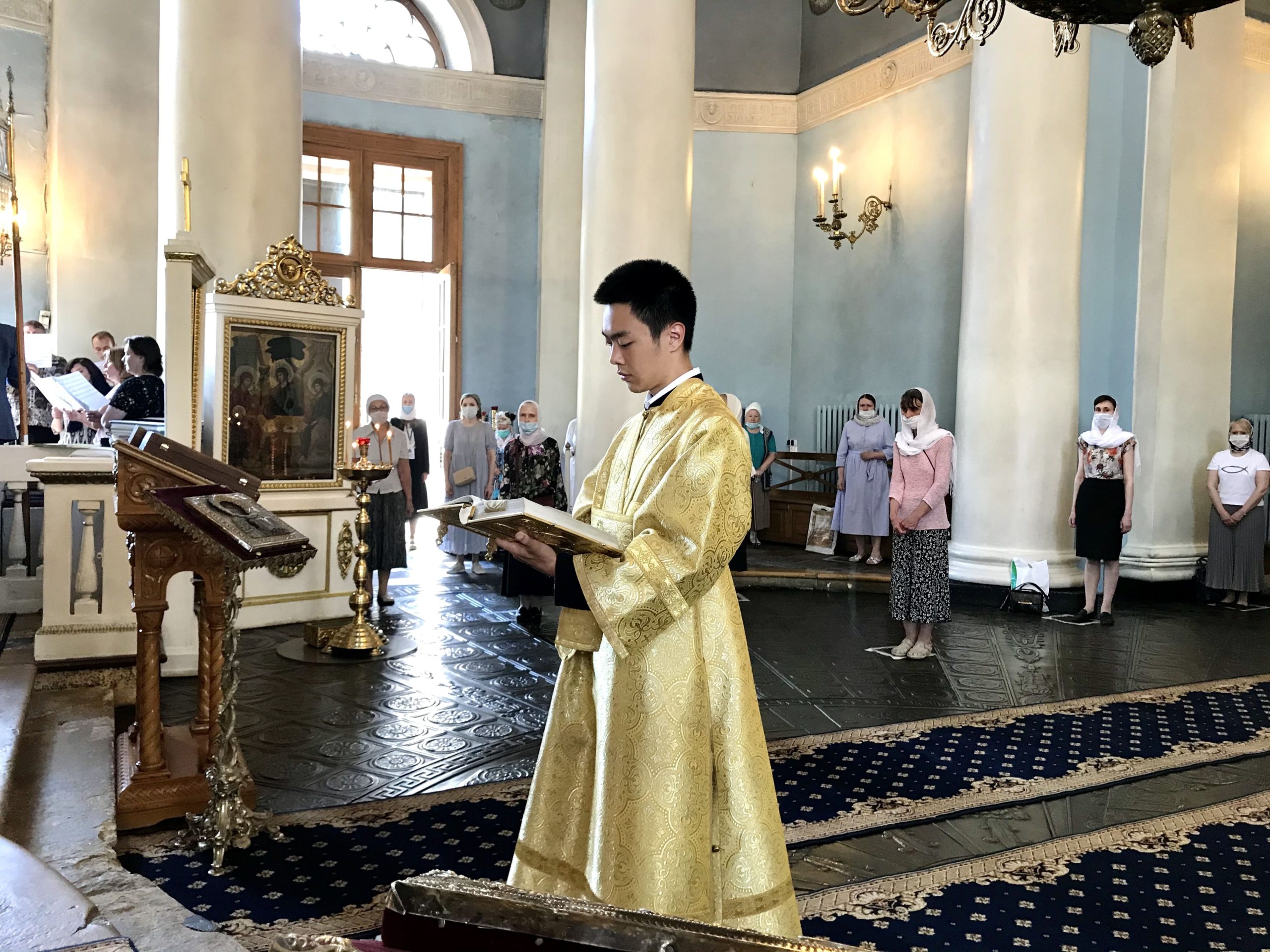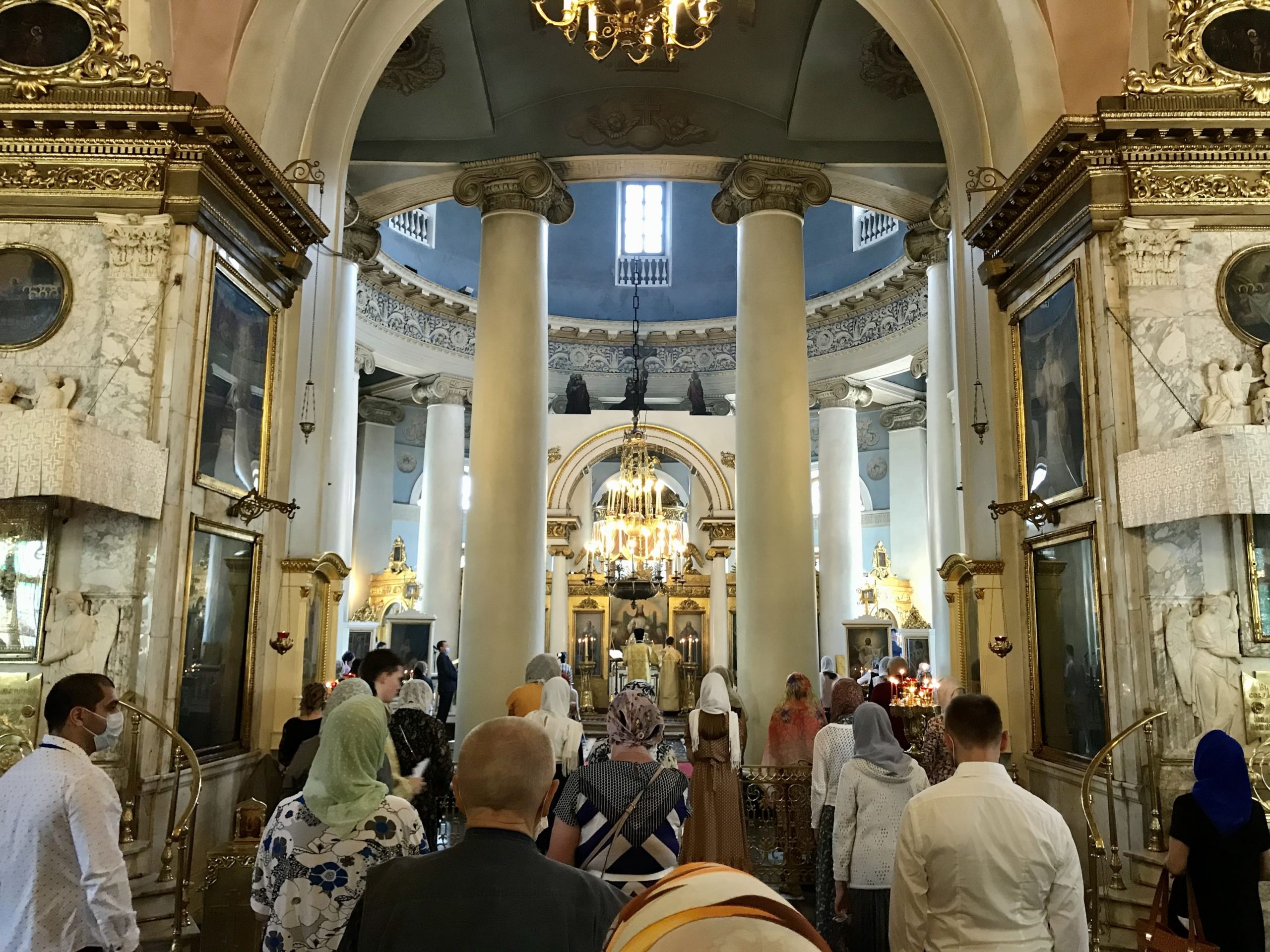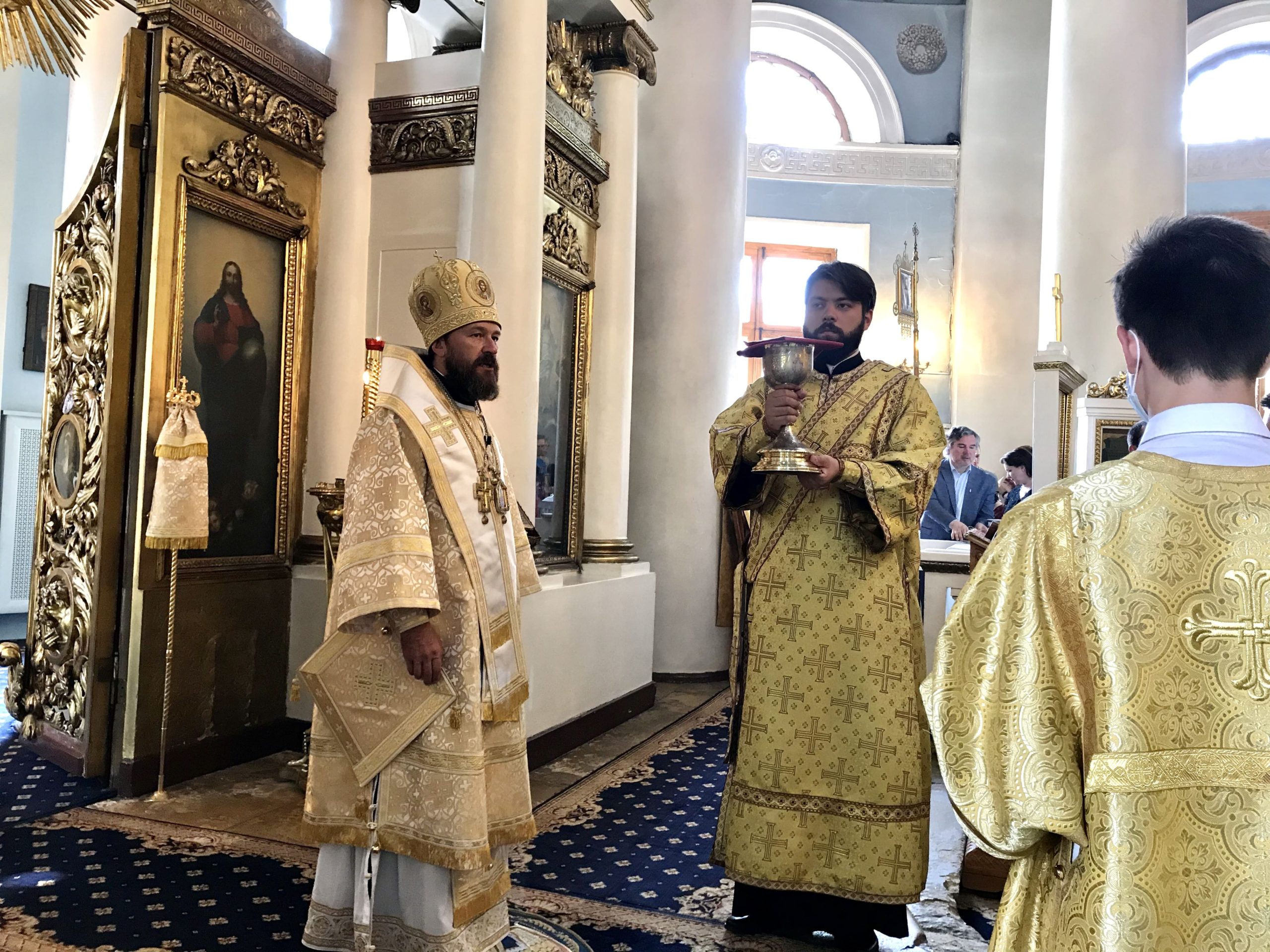Metropolitan Hilarion: the Lord tells us to seek first the Heavenly Kingdom










On 28th June 2020, 3rd Sunday after Pentecost, Metropolitan Hilarion of Volokolamsk, chairman of the Moscow Patriarchate’s Department for External Church Relations, celebrated the Divine Liturgy at the Church of ‘The Joy of All Who Sorrow’ Icon of the Mother of God in Bolshaya Ordynka Street, Moscow. Concelebrating with Vladyka Hilarion were clerics of the church.
During the Litany of Fervent Supplication special prayers were offered due to the danger of the spreading coronavirus infection.
After the Litany of Fervent Supplication Metropolitan Hilarion lifted a prayer read at a time of spreading of the harmful pestilence.
After the Liturgy the archpastor delivered a homily:
“In the name of the Father, and of the Son, and of the Holy Spirit!
“Dear fathers, brothers and sisters,
“This Sunday, during the reading from the Gospel According to Matthew, we have heard the words of our Lord Jesus Christ that no man can serve two masters for he will either take care of the one and neglect the other; or else he will please the one and despise the other. “Ye cannot serve God and mammon,” the Lord says (Mt 6:24), that is, to serve God and at the same time the mundane material wealth.
“The Lord addressed these words to His disciples, but they are also addressed to each of us. These words do not imply that people must renounce all kinds of earthly property and live in carelessness, laziness and idleness. By calling us not to be anxious about the morrow, our Lord Jesus Christ does not mean, for instance, that parents should not care for their children, for their sustenance and material welfare, or that grown-up children should not take care of their elderly parents. The Lord does not call upon us to be careless, lazy or passive. He calls upon us to put God and the Heavenly Kingdom first. And all the rest will be aligned around this sole pivot, this sole foundation, on which the Lord urges us to build up our earthly life.
“Our whole earthly life consists of spiritual and material blessings. Inevitably, we ought to take care of ourselves and of those around us. We ought to think not only about this day, but also about the morrow. Yet, the Lord tells us that concern for mundane things should not fill our heart, that we should not devote our whole life to seeking worldly prosperity and wealth or to striving with all our heart to acquire worldly possessions.
“The Lord urges us to take care of those around us, first and foremost, of the members of our family, our relatives and friends. Yet, the Lord tells us to seek first the Kingdom of God, saying: all this, i.e. material welfare and material wealth, will come to you if you seek the Heavenly Kingdom.
“Lending an attentive ear to the words of our Lord Jesus Christ, we can apply them to our own life, asking ourselves what it is that we are seeking first in life: earthly well-being, earthly wealth and earthly comfort or the Heavenly Kingdom given unto us by the Lord Jesus Christ.
“Someone will ask: what is the Heavenly Kingdom? Many times in the Gospel the Lord Jesus Christ spoke about the Heavenly Kingdom, but never He explained what it was. Maybe, we need to disdain earthly life and only think about the life to come? Or, maybe, we need to disdain our mundane labours and only think about the life of the spirit?
“The Lord does not urge us to leave the world, to renounce the world and our neighbours, like monks do, who have chosen a special walk of life. Yet, the Lord tells us to always put God first, to always have God in our heart. These words apply both to monastics and laity.
“The Lord did not explain us what the Heavenly Kingdom is, but each of us knows about this Kingdom from our own inner spiritual experience. When we go to a store or a market, to some secular institution, or to a cinema, theatre or concert hall, there we will not find the Heavenly Kingdom, but can only acquire material possessions or gain aesthetic pleasure. But when we come to a church of God, when we pray together and partake of the Holy Mysteries of Christ, then we partake of the Heavenly Kingdom which is not somewhere far off, not in some distant future perspective, not in the afterlife world and afterlife kingdom, but is here, in our midst and, as the Lord says, inside us.
“However, one may come to church and not feel the Heavenly Kingdom in his/her heart. One may attend a divine service and stand with scattered thoughts and confused emotions, may hear the words of prayers and at the same time be concerned over material comforts, may hear the singing of the church choir and think about the morrow.
“The Lord calls upon us to concentrate and thoughtfully participate in the liturgy, to lend an attentive ear to the words of the Holy Scripture and to the words of the prayers sung by the choir and uttered by the priest, deacon or reader. Every word of these prayers has life-giving and miracle-working power, if only we learn to hear them and apply to our life.
“The word of the Gospel of our Lord Jesus Christ may have different effect on people, and people may present different interpretations of the Saviour’s words. Regrettably, there are interpretations which are false, erroneous, wrong. In order to beware of them, we must always rely on how the Holy Scripture was interpreted in the Church of Christ.
“Throughout the centuries of the Church’s existence, the Holy Scripture has been heard in the churches of God, and the holy fathers interpreted it. Today we commemorate two Western theologians – Blessed Jerome of Stridon and Blessed Augustine, Bishop of Hippo.
“Blessed Jerome was one of the most learned scholars of his time. He had a perfect knowledge of the Hebrew and Greek languages, and his native language was Latin. He translated the entire Bible into Latin: the Old Testament from Hebrew, the New Testament from Greek. He wrote numerous theological treatises, including a commentary on the Gospel According to Matthew, which each of us can read, because it is available on the Internet.
“Blessed Augustine, Bishop of Hippo, lived a little later than Blessed Jerome, but they kept up correspondence. Sometimes they even argued over certain theological issues. Blessed Augustine left a rich literary heritage, including a treatise entitled “On the Harmony of the Evangelists,” in which he compares the narratives of the four Evangelists in the seemingly differing places and explains how to connect these narratives in order to receive the complete picture of what happened in the earthly life of our Lord Jesus Christ.
“Writings of the holy fathers have great riches of meaning. It is the writings of the holy fathers –Eastern, Western, Greek, Syrian, Latin and Russian ones – that contain the interpretation of the Holy Scripture which is accepted in the Church and which offers us deep insight into the text of the Gospel.
“However, no interpretation, no most scholarly and wisest book can take the place of our own experience of the life in Christ. No matter how often we read in the writings of the holy fathers what the Heavenly Kingdom is, if in our heart and mind we do not partake of God’s Kingdom, we will never learn what it is. The Church gives us such opportunity through the Divine Liturgy, through the Holy Sacraments, through the very order of her liturgical life. She gives us an opportunity to partake of the Heavenly Kingdom that awaits every believer in Christ, if he/she fulfils the Gospel commandments and lives his/her life the way Christ wants.
“Let us learn the wisdom of life from the Gospel. Let us lend an attentive ear to the words of the Lord Jesus Christ Himself, Who teaches us how we should live, what we should put first and how we should seek the Heavenly Kingdom. And let us remember that, as He promised, all the rest will come: bodily and spiritual health, as well as material and spiritual wealth. Amen.”
DECR Communication Service
